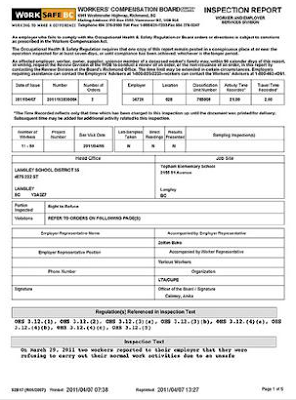The Vancouver Sun reports that a six year old child with an autism disorder, that's right six years old, was removed from a Langley, British Columbia school after a Worksafe BC investigation agreed with a complaint by staff who refused to work at the school because of the danger posed by the six year old autistic boy. The article points out that the staff at the school who refused to work with the young child have no training in something called "the Crisis Response Plan Protocol". The WSBC report also quoted a Langley area Teacher Association President who commented on the lack of adequate "special education" training for teachers.
No one referenced in the article speaks of the need to have teachers and aides with autism specific training working with autistic school children. Here in New Brunswick autism specific training of Resource Teachers and Aides, through the UNB-CEL Autism Intervention Training Program has taken place over the last 6 years with great benefit to many autistic school children, including my son. The UNB-CEL program has received recognition from such sources as David Celiberti, Ph.D., BCBA, President of the Association for Science in Autism Treatment and Eric V. Larsson, Ph.D, LP, BCBA Executive Director of Clinical Services at the Lovaas Institute Midwest.
Unfortunately not all districts and schools educating autistic children have been interested in having autism trained teachers and aides working with autistic children. Here in New Brunswick we still have autistic children being sent home from schools because school staff are not properly trained in how to educate and management the behavioral challenges of autistic children. The problem has been compounded in New Brunswick by the extreme inclusion views of Gordon Porter, currently a special adviser to Education Minister Jody Carr, and the architect of New Brunswick's extreme inclusion model which forcefully encourages all children to be dumped in the mainstream classroom whether or not it is in their best interests to do so.
Autism disorders are neurological disorders which are still not taken seriously by some educators including, apparently, those in BC, and of course New Brunswick's own Gordon Porter. The best interests of autistic children are simply not always on the agenda for cost cutting school administrators or ideologues who believe that only they understand what is best for all school children.
Provide credible autism specific training for those who work with autistic children? Accommodate them, if the best interests of the specific child require a quieter learning environment for all or parts of the school day? Heaven forbid.
Far easier to blame the autistic child, keep him or her out of school, and forget about the child's best interests.

4 comments:
So once again, the system [may] me improved at the expense of a child. Good, but so sad. Staff need training. People will get that training. The child, meanwhile, goes into a different environment, different routines and expectations, and almost certainly loses ground while re-adjusting. Then once trained staff is inplace, does the child face another transfer?
Hi i am herry your bolg is very good i have interested in.
Glutathione
Its pathetic to think our children get punished for their differences. I find it remarkable though that once our mighty kids show improvement, these same people become a fighter alongside you. Patience and education is a two way street, we must not forget to advocate that knowledge for their sake.
"Autistic child who is in mainstream education will not require special education, which means they are unlikely to have obvious learning disabilities. But they will still have special needs.
A teacher should speak to other members of staff and everyone in the school. Make sure that everyone understands what autism is and that they are aware of how this will affect the child’s behaviour.
Sometimes it is helpful to explain to the other children within the class about autism. This will help to prepare them for the autistic child starting school. It will be helpful to explain that the new class member may act differently or strangely – for example they may shout out unexpectedly or laugh at inappropriate things."
Post a Comment